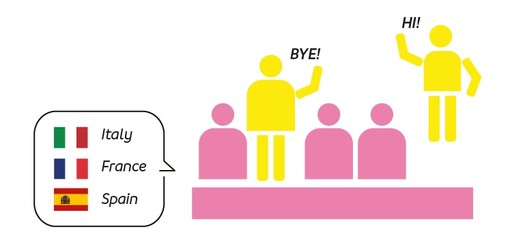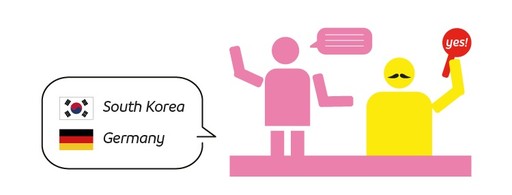你最喜歡和哪一國人開會?
和日本人開會請準時結束;和芬蘭人開會,漫長的停頓是常態;和德國人開會⋯他是滿意還是失望,怎麼都看不出來?英文會議不等於美式會議,面對越來越國際化的工作環境,我們的開會能力也要國際化。進入本文前,看看自己想不想得到這三個動詞的英文是什麼:
(A) 脫軌 (B) 盡情享受 (C) 解讀
As more of us do business across cultures and far-flung offices, every meeting can feel like a riddle if we know nothing about the country's meeting culture. Here are five rules of thumb to make your next international meeting a little less nerve-wracking.
愈來愈多人到海外做生意,如果對各國會議文化一無所知,開會就會開得像猜謎大會。以下是五條讓你在國際會議如魚得水的指導原則。
1. Stick to the schedule
Where: Germany, Austria, Japan
We've all been to meetings that don't start or finish on time. Not so in these nations, where people are cognizant of how much time remains and don't go over. If a meticulously planned meeting runs over the allotted time, the gathering might be deemed unproductive.
1. 嚴守時間表
何處:德國、奧地利、日本
我們皆曾出席不準時展開或結束的會議,但在這些國家不會發生此事,因為人們會注意會議還剩多少時間,不會拖延耽擱。如果精心籌劃的會議超過既訂時間,會被視為績效不彰。

2. Don't even think about a brainstorm
Where: China, Malaysia, Singapore
Debating a topic can go against the traditional Chinese concept of "saving face," which is meant to avoid any actions that could bring embarrassment. In these Asian countries, casting the first stone might (A) derail the entire meeting and (1) stir up a hornet's nest.
2. 忘了腦力激盪吧
何處:中國、馬來西亞、新加坡
辯論可能抵觸傳統的中國「面子」觀念,也就是避免讓人尷尬出糗。在這些亞洲國家,如果率先發動批評,可能導致整場會議出軌,捅出大婁子。

3. (B) Savor the interruptions
Where: Italy, France, Spain
When you meet with clients in Italy or Spain, don't get offended if they duck out early or arrive late. Rather than attend the entire three-hour meeting, your counterparts there - and in some parts of France - might attend based on their own timetable. They tend to come and go, making no apologies for it.
3. 享受干擾
何處:義大利、法國、西班牙
在義大利或西班牙與客戶開會時,如果他們早退或遲到,不要覺得被冒犯。這些國家以及法國部分區域的人們,可能依他們自己的時間表來出席會議。他們來來去去,覺得理所當然。

4. Please, no small talk
Where: Finland, Sweden
While chitchat can be a good way to ease into more serious discussions, this type of warm-up exercise isn't acceptable in places like Finland and Sweden, where non-meeting-related discussions can be perceived as a waste of time. Besides, there might be long pauses in the conversation, which are used as a way to process what the other person is saying.
4. 拜託,不要聊天
何處:芬蘭、瑞典
嚴肅議題開始前先閒話家常能夠和緩氣氛,不過這個暖身操在芬蘭與瑞典不受歡迎,當地人認為,與會議無關的討論,簡直是浪費生命。此外,他們在交談時可能出現很長的停頓,藉此來分析對方的發言。

5. (C) Decode the feedback culture
Where: South Korea, Germany
When you visit Seoul for business meetings, first make sure to understand the relationships of those across the table from you. The most junior team member speaks first to (2) put their two cents worth in, and the decision maker typically speaks last to have the final say. In German meetings, there's often no way to tell how things are going. German clients always play it cool.
5. 解讀回饋文化
何處:南韓、德國
到漢城開會時,先了解對方成員之間的關係。菜鳥會先發表意見,而決策者一般都會壓軸,以作出最後決定。在德國會議中,往往也很難從客戶莫測高深的表情中判斷事情進展如何。

口語字彙
1. Stir up a hornet's nest 惹麻煩,捅婁子
Stir up是「擾亂」、「攪動」的意思,而hornet's nest 就是「大黃蜂的窩」,如果有人擾亂蜂窩,無異是 「自找麻煩」。
John stirred up a hornet's nest when he praised a woman's pretty face in front of his wife.
約翰在太太面前稱讚一名女子的美貌,簡直是自找麻煩。
2. Put your two cents worth in 發表意見
字面意思是「用兩分錢來下注」,原為撲克牌用語,引申為「發表意見」。
The sales manager hopes that everyone will put their two cents worth in at tomorrow's meeting.
業務經理希望在明天的會議上,大家都能發表意見。
本文收錄於英語島English Island 2016年8月號
(A) 脫軌 (B) 盡情享受 (C) 解讀
As more of us do business across cultures and far-flung offices, every meeting can feel like a riddle if we know nothing about the country's meeting culture. Here are five rules of thumb to make your next international meeting a little less nerve-wracking.
愈來愈多人到海外做生意,如果對各國會議文化一無所知,開會就會開得像猜謎大會。以下是五條讓你在國際會議如魚得水的指導原則。
1. Stick to the schedule
Where: Germany, Austria, Japan
We've all been to meetings that don't start or finish on time. Not so in these nations, where people are cognizant of how much time remains and don't go over. If a meticulously planned meeting runs over the allotted time, the gathering might be deemed unproductive.
1. 嚴守時間表
何處:德國、奧地利、日本
我們皆曾出席不準時展開或結束的會議,但在這些國家不會發生此事,因為人們會注意會議還剩多少時間,不會拖延耽擱。如果精心籌劃的會議超過既訂時間,會被視為績效不彰。

2. Don't even think about a brainstorm
Where: China, Malaysia, Singapore
Debating a topic can go against the traditional Chinese concept of "saving face," which is meant to avoid any actions that could bring embarrassment. In these Asian countries, casting the first stone might (A) derail the entire meeting and (1) stir up a hornet's nest.
2. 忘了腦力激盪吧
何處:中國、馬來西亞、新加坡
辯論可能抵觸傳統的中國「面子」觀念,也就是避免讓人尷尬出糗。在這些亞洲國家,如果率先發動批評,可能導致整場會議出軌,捅出大婁子。

3. (B) Savor the interruptions
Where: Italy, France, Spain
When you meet with clients in Italy or Spain, don't get offended if they duck out early or arrive late. Rather than attend the entire three-hour meeting, your counterparts there - and in some parts of France - might attend based on their own timetable. They tend to come and go, making no apologies for it.
3. 享受干擾
何處:義大利、法國、西班牙
在義大利或西班牙與客戶開會時,如果他們早退或遲到,不要覺得被冒犯。這些國家以及法國部分區域的人們,可能依他們自己的時間表來出席會議。他們來來去去,覺得理所當然。

4. Please, no small talk
Where: Finland, Sweden
While chitchat can be a good way to ease into more serious discussions, this type of warm-up exercise isn't acceptable in places like Finland and Sweden, where non-meeting-related discussions can be perceived as a waste of time. Besides, there might be long pauses in the conversation, which are used as a way to process what the other person is saying.
4. 拜託,不要聊天
何處:芬蘭、瑞典
嚴肅議題開始前先閒話家常能夠和緩氣氛,不過這個暖身操在芬蘭與瑞典不受歡迎,當地人認為,與會議無關的討論,簡直是浪費生命。此外,他們在交談時可能出現很長的停頓,藉此來分析對方的發言。

5. (C) Decode the feedback culture
Where: South Korea, Germany
When you visit Seoul for business meetings, first make sure to understand the relationships of those across the table from you. The most junior team member speaks first to (2) put their two cents worth in, and the decision maker typically speaks last to have the final say. In German meetings, there's often no way to tell how things are going. German clients always play it cool.
5. 解讀回饋文化
何處:南韓、德國
到漢城開會時,先了解對方成員之間的關係。菜鳥會先發表意見,而決策者一般都會壓軸,以作出最後決定。在德國會議中,往往也很難從客戶莫測高深的表情中判斷事情進展如何。

口語字彙
1. Stir up a hornet's nest 惹麻煩,捅婁子
Stir up是「擾亂」、「攪動」的意思,而hornet's nest 就是「大黃蜂的窩」,如果有人擾亂蜂窩,無異是 「自找麻煩」。
John stirred up a hornet's nest when he praised a woman's pretty face in front of his wife.
約翰在太太面前稱讚一名女子的美貌,簡直是自找麻煩。
2. Put your two cents worth in 發表意見
字面意思是「用兩分錢來下注」,原為撲克牌用語,引申為「發表意見」。
The sales manager hopes that everyone will put their two cents worth in at tomorrow's meeting.
業務經理希望在明天的會議上,大家都能發表意見。
本文收錄於英語島English Island 2016年8月號
